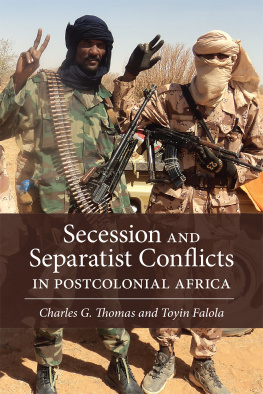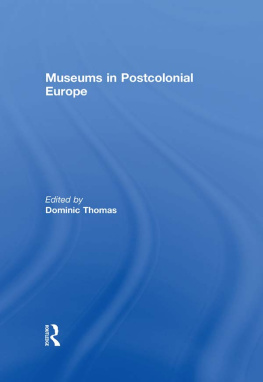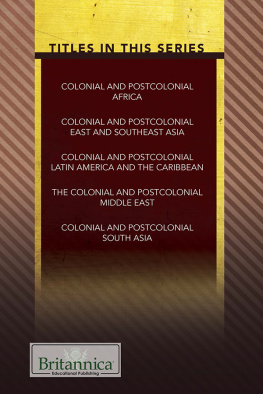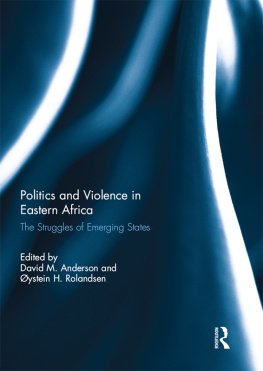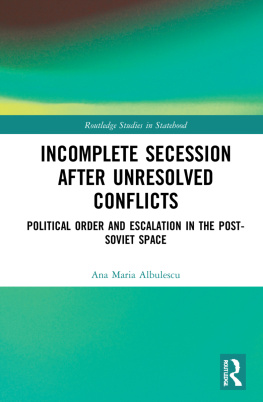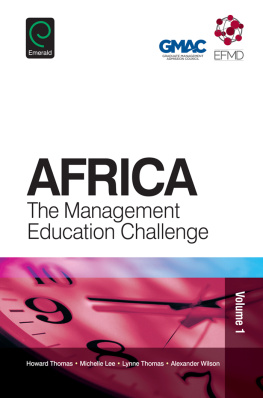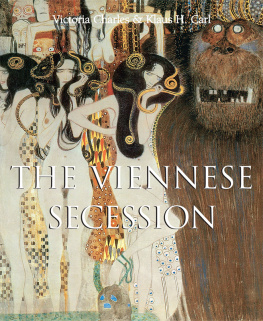Charles G. Thomas - Secession and Separatist Conflicts in Postcolonial Africa
Here you can read online Charles G. Thomas - Secession and Separatist Conflicts in Postcolonial Africa full text of the book (entire story) in english for free. Download pdf and epub, get meaning, cover and reviews about this ebook. year: 2020, publisher: University of Calgary Press, genre: Politics. Description of the work, (preface) as well as reviews are available. Best literature library LitArk.com created for fans of good reading and offers a wide selection of genres:
Romance novel
Science fiction
Adventure
Detective
Science
History
Home and family
Prose
Art
Politics
Computer
Non-fiction
Religion
Business
Children
Humor
Choose a favorite category and find really read worthwhile books. Enjoy immersion in the world of imagination, feel the emotions of the characters or learn something new for yourself, make an fascinating discovery.
- Book:Secession and Separatist Conflicts in Postcolonial Africa
- Author:
- Publisher:University of Calgary Press
- Genre:
- Year:2020
- Rating:3 / 5
- Favourites:Add to favourites
- Your mark:
- 60
- 1
- 2
- 3
- 4
- 5
Secession and Separatist Conflicts in Postcolonial Africa: summary, description and annotation
We offer to read an annotation, description, summary or preface (depends on what the author of the book "Secession and Separatist Conflicts in Postcolonial Africa" wrote himself). If you haven't found the necessary information about the book — write in the comments, we will try to find it.
Secession and Separatist Conflicts in Postcolonial Africa — read online for free the complete book (whole text) full work
Below is the text of the book, divided by pages. System saving the place of the last page read, allows you to conveniently read the book "Secession and Separatist Conflicts in Postcolonial Africa" online for free, without having to search again every time where you left off. Put a bookmark, and you can go to the page where you finished reading at any time.
Font size:
Interval:
Bookmark:

AFRICA: MISSING VOICES SERIES
Timothy Stapleton, Professor, History, University of Calgary
ISSN 1703-1826 (Print) ISSN 1925-5675 (Online)
This series addresses issues and topics that have been overlooked in political, social, and historical discussions about Africa.
No. 1Grassroots Governance?: Chiefs in Africa and the Afro-Caribbean
Edited by D.I. Ray and P.S. Reddy Copublished with the International
Association of Schools and Institutes of Administration (IASIA)
No. 2TheAfrican Diaspora in Canada: Negotiating Identity and Belonging
Edited by Wisdom Tettey and Korbla Puplampu
No. 3A Common Hunger: Land Rights in Canada and South Africa
By Joan G. Fairweather
No. 4New Directions in African Education: Challenges and Possibilities
Edited by S. Nombuso Dlamini
No. 5Shrines in Africa: History, Politics, and Society
Edited by Allan Charles Dawson
No. 6The Land Has Changed: History, Society and Gender in Colonial Eastern Nigeria
By Chima J. Korieh
No. 7African Wars: A Defense Intelligence Perspective
By William G. Thom
No. 8Reinventing African Chieftaincy in the Age of AIDS, Gender, Governance,
and Development
Edited by Donald I. Ray, Tim Quinlan, Keshav Sharma, and Tacita A.O. Clarke
No. 9The Politics of Access: University Education and Nation-Building in Nigeria,
19482000
By Ogechi Emmanuel Anyanwu
No. 10Social Work in Africa: Exploring Culturally Relevant Education and Practice in Ghana By Linda Kreitzer
No. 11Secession and Separatist Conflicts in Postcolonial Africa
By Charles G. Thomas and Toyin Falola

2020 Charles G. Thomas and Toyin Falola
University of Calgary Press
2500 University Drive NW
Calgary, Alberta
Canada T2N 1N4
press.ucalgary.ca
This book is available as an ebook which is licensed under a Creative Commons license. The publisher should be contacted for any commercial use which falls outside the terms of that license.
Library and Archives Canada Cataloguing in Publication
Title: Secession and separatist conflicts in postcolonial Africa / Charles G. Thomas
and Toyin Falola.
Names: Thomas, Charles G., 1979- author. | Falola, Toyin, author.
Series: Africa, missing voices series ; no. 11. ISSN 1703-1826
Description: Series statement: Africa: missing voices series, ISSN 1703-1826 ;
no. 11 | Includes bibliographical references and index.
Identifiers: Canadiana (print) 20190214708 | Canadiana (ebook) 20190214775 |
ISBN 9781773851266 (softcover) | ISBN 9781773851273 (Open Access PDF) |
ISBN 9781773851280 (PDF) | ISBN 9781773851297 (EPUB) | ISBN
9781773851303 (Kindle)
Subjects: LCSH: SecessionAfricaHistory20th century. | LCSH: Africa
HistoryAutonomy and independence movements.
Classification: LCC DT30.5 .T56 2020 | DDC 320.1/5096dc23
The University of Calgary Press acknowledges the support of the Government of Alberta through the Alberta Media Fund for our publications. We acknowledge the financial support of the Government of Canada. We acknowledge the financial support of the Canada Council for the Arts for our publishing program.

Copyediting by Peter Enman
Cover image by Magharebia, used under the Creative Commons License Attribution 2.0 License (https://creativecommons.org/licenses/by/2.0/deed.en).
This image has been lightly altered from the original. Original image can be found at https://commons.wikimedia.org/wiki/File:Le_Mali_entame_le_dialogue_avec_les_Touaregs_(6972875286).jpg
Cover design, page design, and typesetting by Melina Cusano
All maps by Nathan E. McCormack and Charles G. Thomas
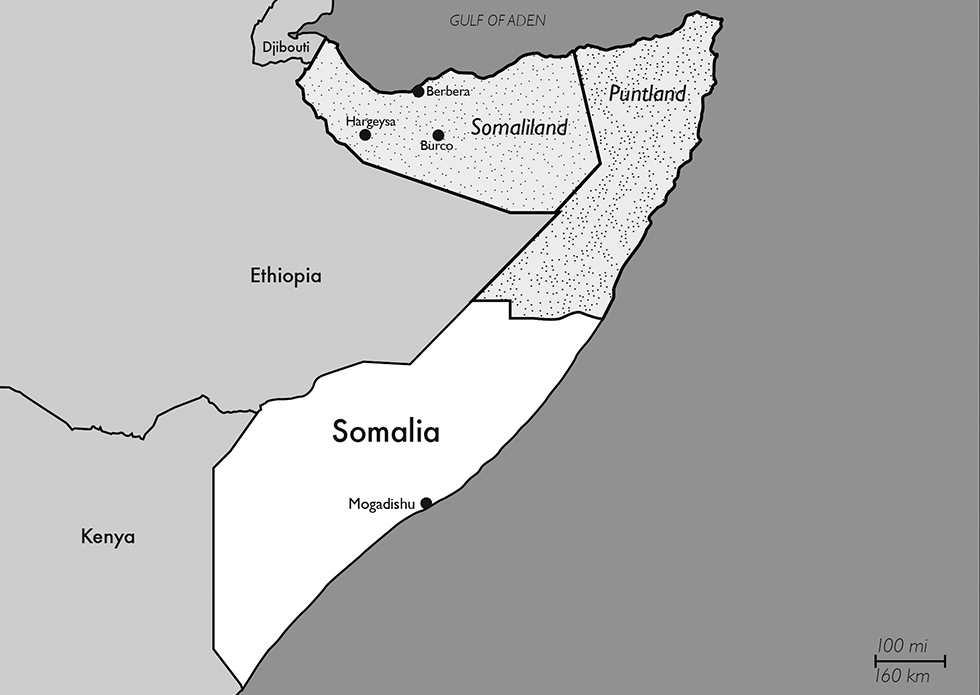
Copyright 2014 Nathan E. McCormack and Charles G. Thomas
De Facto Secession and the New Borders of Africa: Somaliland, 1991Present
Of all the case studies presented in this book, none is more indicative of both the legacies of past secessionist attempts and the present global political dynamics than the unrecognized state of Somaliland. The legacies of the past have imposed a continued insistence that the boundaries of all African states remain sacrosanct absent the express permission of the mother state; this has left Somaliland without international recognition despite having existed as a separate and autonomous territory for over twenty years. However, the end of the Cold War and the increasingly tenuous questions of sovereignty and the nation-state have meant that despite this lack of official recognition of its sovereignty, Somaliland has found pragmatic partners in the Horn of Africa, the Red Sea region, and across the globe to sustain itself and the increasingly capable state structures that define it. This chapter will explore the role of Somaliland in the current secessionist and separatist dynamics in Africa and how the denial of de jure sovereignty has, in the current age, not prevented its de facto existence.
It would be a misnomer to discuss the conflict that resulted in Somaliland as a secessionist insurgency from the outset. The separation of Somaliland from Somalia proper was not expected by the combatants, nor was it originally desired. It was only the collapse of the rest of the state into a deadly civil war and its inability to effectively reintegrate that convinced the people of Somaliland that they not only could but should remain a separate political body. However, the previous reform conflict and the insurgency that drove it remain an essential component of the eventual separation of Somaliland and as such deserve discussion to contextualize the current state of Somaliland and its relations with its neighbours.
The seeds of the reform movement that would eventually coalesce into the Somali National Movement and the separation of Somaliland from Somalia were planted in 1969. In that year, the elected government of the United Republic of Somalia was overthrown by the military regime of Mohamed Siad Barre and his Supreme Revolutionary Council. This made the reclamation of the Ogaden a central pillar of Siad Barres Pan-Somali ideology, which was increasingly buttressing the social transformation of his country.
However, at least initially the direct annexation of the Ogaden was out of reach for Siad Barres regime. Instead, significant efforts were made to support the Western Somali Liberation Front (WSLF), a dissident insurgency in the Ogaden that had irredentist goals and its own Pan-Somali ideology.
While this effectively ended the hopes for a Greater Somalia for the time being, hostilities would continue back and forth between the now U.S.-aligned Somalia and the Soviet and Cubanbacked Ethiopia. However, as the formal war ended, the informal war between the two increased in intensity. Without the success of Pan-Somalism and with the loss of the economic support of the Soviet Union, Siad Barres regime began to lose support amongst the rival power blocs within Somalia. The acceptance of structural reforms in return for aid from the IMF was a tipping point, crushing the ability of local peasant agriculturalists to compete economically and creating broad opposition to the regime. Dissident fronts emerged in attempts to force alterations in the governance of Somalia. These included Mohamed Farah Aideeds United Somali Congress (USC), Abdullahi Yusuf Ahmeds Somali Salvation Democratic Front, and the primarily Isaaq clanbacked Somali National Movement (SNM). Each of these fronts was dedicated to the concept of Somalia as a whole, but wished to overthrow Siad Barre. Given Siad Barres continued support for the WSLF in the Ogaden and his continued ambitions on the Ogaden, Ethiopia proved to be a silent haven for these fronts as they found their footing in the early 1980s.
Font size:
Interval:
Bookmark:
Similar books «Secession and Separatist Conflicts in Postcolonial Africa»
Look at similar books to Secession and Separatist Conflicts in Postcolonial Africa. We have selected literature similar in name and meaning in the hope of providing readers with more options to find new, interesting, not yet read works.
Discussion, reviews of the book Secession and Separatist Conflicts in Postcolonial Africa and just readers' own opinions. Leave your comments, write what you think about the work, its meaning or the main characters. Specify what exactly you liked and what you didn't like, and why you think so.

